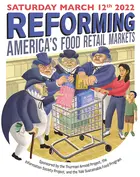The conference convened academics, policymakers, practitioners, and journalists to exchange ideas on how to address the lack of competition in food retail markets. The papers in the compendium explore how antitrust enforcement and competition policy can improve food retail markets in America.
“The conference provided a forum for those of us working on the front lines of creating a more equitable and balanced retail food system to gather and collaborate,” said TAP founder Fiona Scott Morton, the Theodore Nierenberg Professor of Economics. “The compendium shares our findings in critical areas that impact consumers directly.”
Yale students authored some of the papers. Matene Alikhani ’24 co-authored a paper with Bruno Renzetti ’22, a Yale Law School graduate, titled “Smile! You’re on Camera: Data Collection in Food Retailing Markets.”
“The paper primarily focuses on the new technology being explored by Amazon Go stores called Just Walk Out,” Alikhani said. “This technology is meant to make grocery shopping more efficient by eliminating the checkout line through strategically placed cameras and sensors. Our paper discusses the competitive implications and the impact on data privacy that would result from this technology, as well as possible legislative and enforcement changes.”
Student authors also attended the conference. “It was a fantastic experience that brought together academics, industry experts, and practitioners to discuss competitive challenges in agricultural markets,” Alikhani said. “I learned a great deal and was able to see a diversity of perspective that showed the complexity of modern agriculture.”
TAP was launched in fall 2019 in response to the growing interest in competition enforcement from scholars, students, and the general public in various industries. The project is named in honor of Thurman Arnold, Yale Law professor and head of the U.S. Justice Department’s Antitrust Division from 1938 to 1943. The project brings together Yale scholars and students to conduct antitrust research and policy, disseminate it, and enable links to enforcement and regulatory policy.
“Over these past few years, many of us have thought more carefully about what we buy and how we shop for groceries,” said Austin Frerick, TAP deputy director. “It’s more critical than ever that Americans understand the lack of competition and the level of consolidation in an industry they interact with almost every day.”




